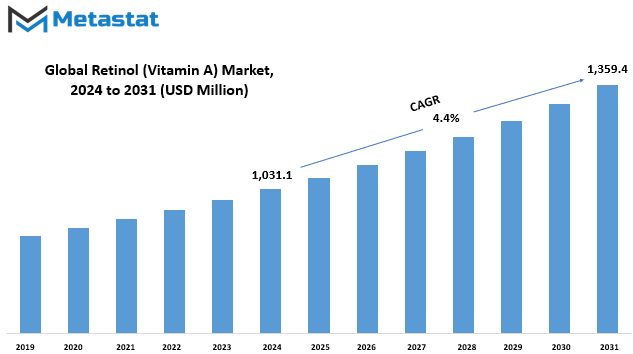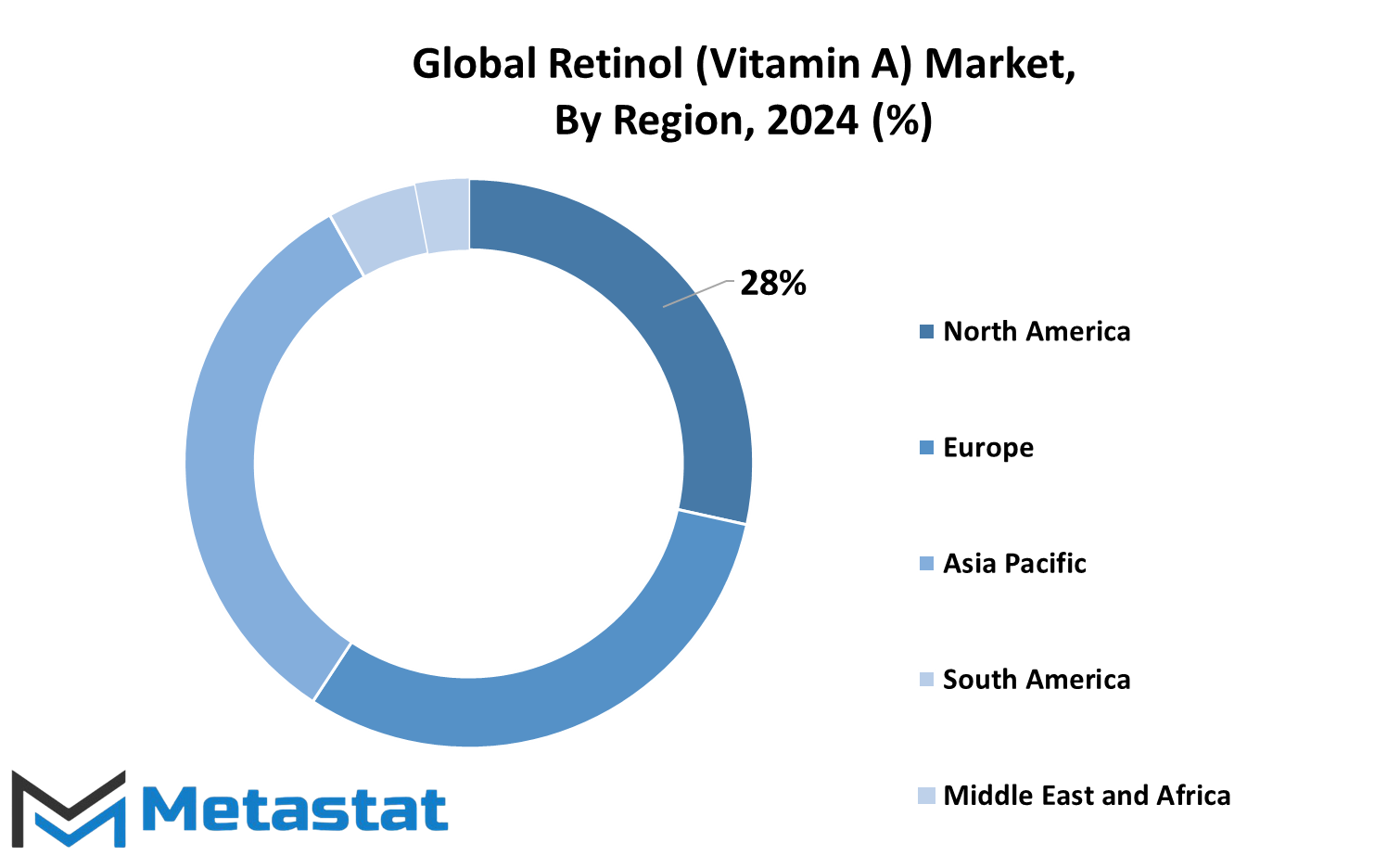MARKET OVERVIEW
The Global Retinol (Vitamin A) market is important to pharmaceuticals as well as to cosmetics. Retinol is the Vitamin A compound recognized most widely for its skin-protective, sight-saving and overall cellular effects. Thus, as consumers gain a deeper appreciation for skincare and for overall health, so will be their demand for products using retinol. These markets will push boundaries toward usage in more applications throughout other industries. Formulation technology advances in types of products that use this very powerful vitamin will most likely power the coming years. For retinol, though, it will remain as one of the cornerstone ingredients in anti-aging products in the cosmetic industry.
This is because most customers are attracted to its widely documented ability to minimize wrinkles, fine lines, and other signs of aging. This is bound to continue spreading more awareness in the scientific world of skincare, which means that demand for scientifically established ingredients like retinol will grow further in an attempt to target the consumer's skin texture, pigmentation, and clarity. In that respect, consumer behavior trends will also propel further growth of the Global Retinol (Vitamin A) market in the beauty and personal care sector.
The pharmaceutical segment will remain a key constituent of the retinol demand. These drugs are replete with retinol because it is so essential for the differentiation of cells and to the health of epithelial tissue. Therefore, it will continue to be in high demand as a prime active constituent in many drugs. There also soon should come up some more targeting specificity new vitamin A derivatives formulation for skins and many other health conditions in the future, so to say, sending them to wider applications. Applications for retinol won't be limited only up to the skincare and pharmaceuticals industries. Nutritional supplements of Vitamin A in huge demand simply because that a good immune function, with better vision, and having skin look healthy. The future would be the period of higher consumption of Vitamin A supplements, particularly in regions where this vital nutrient deficiency is higher.
In a conscious and increasingly aware generation of a well-balanced diet and its impact on health, the demand for retinol in dietary supplements would be higher. Industrial production of retinol would advance, in addition to applications in the beauty, pharmaceutical, and nutraceutical industries. Scientists and manufacturers will advance new and better methods in retinol production and formulation.
The processes used for retinol synthetically, will become sophisticated, targeting the widespread consumption, of cost-effective solution for use. This brings about availability and accessibility that raises more consumers, to cut across all economic lines, regional economies. In addition, the regulatory environment will determine the future development of the Global Retinol (Vitamin A) market. The regulations for the composition and safety of cosmetic products will become stricter, which means that retinol products will have to meet quality and safety standards. As the consciousness of consumers' savvyness and demands for increased product transparency increase, so does the role of the regulatory authorities in monitoring product claims as well as efficacy. Consequently, these regulations will contribute to sustained credulity and demand for retinol-based products in global markets.
With the change in consumer preferences, scientific discoveries, and awareness of the benefits of retinol, the market will continue to grow. Both pharmaceutical and cosmetic sectors will keep driving the demand for this essential vitamin, making it a key player in the health and beauty industries for years to come.
Global Retinol (Vitamin A) market is estimated to reach $1,359.4 Million by 2031; growing at a CAGR of 4.4% from 2024 to 2031.

GROWTH FACTORS
The global retinol (Vitamin A) market is likely to expand drastically in the coming years. The fundamental drivers behind this expansion are mainly the growth in demand for anti-aging skincare products as well as their usage in cosmetic applications. Most aged consumers look for products that mitigate the manifestations of aging in the body, such as wrinkles and fine lines. Retinol, well known for its effectiveness in skin regeneration and enhancing the quality of skin, is one of the main reasons behind such apprehension. As demand for products that contain retinol because of its anti-aging property increases, the usage of retinol-based cosmetics will increase, which, in turn, will augment the growth of the market positively. Growing awareness about the benefits of Vitamin A for immune health and vision care is also one of the major drivers for the global retinol market.
Vitamin A is required for vision health, mainly in preventing night blindness, as well as for the immune system. Therefore, as there is an increase in the demand for healthy lifestyles and more education in the need for essential nutrients, products containing retinol would be in greater demand not only for its skin advantages but also for its wider health benefits. This awareness of the multiple activity functions of Vitamin A will push the market forward. However, despite these strong growth drivers, there may be some challenges that are likely to impede market growth. One such obstacle is the side effects arising from excessive retinol consumption.
Excessive application of retinol causes irritation of the skin, redness, and peeling, which could make some consumers avoid using these products. Strict regulatory approvals for cosmetic and pharmaceutical formulations can also hinder the growth of the market. These regulations ensure safety and effectiveness of products, but they can delay bringing new retinol-based products to the market. New opportunities in the form of plant-based retinol alternatives are likely to emerge in the global retinol market. Therefore, the growing demand for consumer interest in clean-beauty products, to include to a great extent for the vegan side of this revolution, also creates an added alternative as retinol-synthetically sourced that may end up harming living creatures: The need of a naturally produced and found compound related to plant alternatives would significantly help this developing movement expand more.
MARKET SEGMENTATION
By Type
Recently, there has been a big shift in the Global Retinol (Vitamin A) market due to both consumer and industry realizations regarding its need in several spheres. This market includes natural retinol derived from either plants or animals and synthetic retinol. Its marvelous potential had arisen mainly due to technological improvements and shifts in consumer preference. Synthetic retinol is the market leader in 2019, with a market share of 59.7% and a value of 498.1 million US dollars. This market leader remains strong due to its price efficiency and consistent quality. There is huge potential for change in the market as people get more aware of the benefits of Vitamin A.
As an ingredient that is used in most skincare products, dietary supplements, and pharmaceuticals, retinol is quite crucial in various industries. Its origin as a natural source of fish liver oil or from carrots has gained popularity in the minds of eco-conscious consumers who are looking at ways to maintain sustainability. However, synthetic retinol is also synthesized to fulfill high market demands.
The cosmetic application has also been identified as a main market driver for Global Retinol (Vitamin A). Massive growth has been reported in Retinol-rich skincare since they are claimed to offer effective solutions that remove wrinkles, lines, and patchy complexion.
With advanced technologies developed to formulate new, effective, and safe formulations for various skin types, this trend will be continued. Moreover, the rising demand for anti-aging products is expected to catalyze further growth in this segment. Apart from cosmetics, the pharmaceutical industry is very important in the forming of the market. Vitamin A has been administered to treat deficiency, promote vision health, and enhance immunity, so it remains relevant in medicine. This aspect indicates both natural and synthetic sources importance in catering to different needs. Due to the continued research about the broader health benefits of retinol, the market is about to explore new horizons in coming years. The global push towards sustainability and clean-label products will continue to impact the market dynamics, with a particular emphasis on natural retinol. As awareness picks up, brands will surely invest in eco-friendly sourcing and production methods. Nevertheless, synthetic retinol will remain important due to its ability to provide stable, affordable options for different types of industries.
The Global Retinol (Vitamin A) market is poised for growth under the impulse of innovation, consumer awareness, and the scope of its applications. A balance must be struck between an increasing need for sustainability practices and scalability to ensure a future that keeps it highly relevant to modern life.
By Application
This global Retinol (Vitamin A) market will gain significantly as it is employed in various industries. Since Vitamin A derivative Retinol is known to possess tremendous transformative properties, particularly health and wellness, it has been employed in the improvement of health care by enriching skin health, immunization function, and well-being in general, hence finding its way in several other sectors, and therefore it promises bright for future applications.
The primary application of retinol is in the cosmetic and personal care segment. As consumers are increasingly in need of skin health and anti-aging solutions, products containing retinol have become highly popular. Its characteristics include the reduction of fine lines, improvement of skin texture, and stimulation of collagen production, which are characteristics of a skincare product. Consequently, the demand for retinol-based cosmetics will surge with technology advancement and a gradual increase in consumer awareness. Future innovations may find better, more sustainable, and effective formulations catering to a considerable populace interested in efficacy and caring about impact on the environment. Importance is also placed on dietary supplements to include another vital segment of the market on retinol.
Being known to help support vision, bone, and immune functions, this vitamin is a must in health-oriented products. Vitamin A in dietary supplements should be expected to rise considerably as the global population is now becoming more health-conscious. Manufacturers are coming up with new delivery systems such as chewables, powders, and gummies that can present supplements in more appealing forms to various age groups. Pharmaceutical applications of retinol are equally noteworthy. It is widely used in treatments for skin disorders, vision-related conditions, and immune deficiencies. As research progresses, retinol may be utilized in new therapeutic areas, offering innovative solutions to complex medical challenges. The potential for its integration into advanced drug delivery systems signals a future where retinol-based medicines could become more effective and patient-friendly.
In the food and beverage sector, retinol is now more commonly used in improving nutritional content. The types of foods and beverages that are fortified are dairy products and cereals, to reduce Vitamin A deficiencies globally. As consumers increasingly choose healthier lifestyles, the food industry is likely to use more retinol, thereby allowing more access to this vital nutrient.
The Global Retinol (Vitamin A) Market will grow as it innovates, changing with consumer needs. With growing applications in industrial processes, its importance will definitely place it at the forefront and contribute to the promotion of health and wellness across the world.
By Distribution Channel
The Global Retinol (Vitamin A) market is a dynamic market, and the industry is projected to grow significantly in the coming years due to shifting consumer preferences, technological advancements, and changes in distribution patterns. Retinol, one of the most sought-after derivatives of Vitamin A, is widely valued for its benefits in skincare and healthcare products. As the awareness relating to the effectiveness of retinol in skin texture improvement, mitigation of fine lines, and overall protection of the health of skin increases, retinol-based products witness steady rises in demand over time.
Distribution channel The distribution channel of the market is broken down into the two aspects of offline and online. Offline This channel involves mainly retail outlets, pharmacy, and specialty stores for traditional operations. It is relevant today because of the personal experience a customer gets to have. It gives a customer an opportunity to feel and examine the products for themselves and even consult knowledgeable staff.
Additionally, there are offline channels, and those customers prefer in-store purchases instead of online purchases due to factors such as trust and convenience. But the online portion is becoming quite huge as e-commerce site popularity and consumers going more digital in terms of buying stuff are rising quite dramatically. Online shopping is really very convenient, which helps because one consumer can look upon a thousand products sitting back in their home.
Competitive pricing, reviews, detailed description of the products-easy decision making process. This channel is expected to be a market leader in the coming years due to the increase in internet penetration and smartphone usage around the world. Going forward, the technological advancements are sure to redefine both the offline and online channels. The former would have augmented reality and artificial intelligence in their offline stores to enhance product demonstrations and recommendations. Likewise, the online channels would also look for innovation in virtual skin consultations and data analytics-based targeted marketing campaigns. All these would respond to the changing demands of consumers and stabilize the market growth curve. Higher consumer awareness of the benefits of skincare and wellness also drives the Global Retinol (Vitamin A) market. Other factors propelling this market forward are more efficient, sustainable, and ethically sourced retinol products. Rising competition in both offline and online channels will demand better customer experiences and offerings for brands.
As distribution strategies evolve to align with consumer preferences and leverages emerging technologies, market growth is expected to sustain. Both offline and online platforms will play crucial roles in shaping the future of the industry, ensuring high-quality retinol products remain accessible to a growing global audience.
By End-Use Industry
A great change awaits the international market for Retinol, or Vitamin A. These transform with their applications in different fields. This kind of market holds potential wherever technology is being developed as well as the trend is shifting in consumers' minds. If discussed specifically on the aspect of the end use like cosmetics and skin care, then this direction in which the market will grow has now acquired a better sense.
Retinol is the corner-stone ingredient for cosmetics and skincare, known for its property of regenerating the skin, which has now become a staple ingredient in many anti-aging and acne treatment formulations. As the consumer's awareness of Retinol benefits increases, so does the demand for new product formulations. Improvements in formulation to address specific skin problems and delivery mechanisms will also increase its efficacy and versatility. Skincare enthusiasts remain highly particular about effective, science-backed products, which is indicative that the cosmetic and skincare industry will be key to molding this market.
Retinol has been very well established in the pharmaceutical world in terms of therapeutic application. It is applied for curing various disorders like vision-related problems, skin disorders, and deficiency conditions. In the future, emphasis on preventive health care and increasing accessibility of health care facilities around the globe will further promote its application in pharmaceuticals. Further research may involve improving synthesis techniques that would make it even more bioavailable and economical, hence, making it available to an even larger population.
Dietary and Nutritional supplements constitute another crucial portion of the Global Retinol Market. Consumers are giving more importance to health and wellness; vitamin-enriched supplements are going to see an upward surge. Being crucial for vision, immunity, and cell growth, retinol is present in most of these supplements. There will be a definite further expansion of its use because of increasing awareness regarding balanced nutrition and personalized dietary solutions. It may see growth in functional foods or targeted supplementation for certain demographics, such as children or the elderly. Another contributor of the Retinol growth is the food and beverages industry. Vitamin A is added to milk, cereal, and beverage products in population areas with deficiencies of nutritious diets. This is where combated malnutrition and healthy advancement will promote the development in fortified food products.
As these businesses continue to innovate, global demand for Retinol is likely to change dynamically based on new consumer requests and technological advancements. The association between these industries will have the Retinol remain integrated into different applications as its growth mirrors societal concerns with regard to health and wellness.
|
Report Coverage |
Details |
|
Forecast Period |
2024-2031 |
|
Market Size in 2024 |
$1,031.1 million |
|
Market Size by 2031 |
$1,359.4 Million |
|
Growth Rate from 2024 to 2031 |
4.4% |
|
Base Year |
2022 |
|
Regions Covered |
North America, Europe, Asia-Pacific Green, South America, Middle East & Africa |
REGIONAL ANALYSIS
The global Retinol (Vitamin A) market has been constantly growing and, therefore, seems promising for the future, with its influence being seen in many sectors such as skincare, pharmaceuticals, and nutrition. The growth of this market is mainly due to the increased awareness of Vitamin A's benefits, which plays a vital role in maintaining healthy skin, vision, and overall wellness. In the following years, significant changes are to be witnessed across the market with influences arising from aspects like technological revolutions, evolving consumer preference for more environment-friendly and more natural products.
If seen through a geographic perspective, a clear point emerges: Each region has its distinct role that it would play in terms of this global Retinol (Vitamin A) market in the next few years. North America will be another important region as these countries already have established industries and better healthcare systems; therefore, it will keep the vitamin A applications industry thriving and developing with innovative skincare products. Anti-aging product demand is on the rise in Europe, including countries such as the UK, Germany, France, and Italy, thus driving the need for innovative applications of Retinol. The European market has been leading in skincare innovation for a long time, and this is most likely to continue. With the growing awareness among consumers about the importance of vitamin-rich products, coupled with a strong preference for clean and natural ingredients, will ensure the continued demand for Retinol-based products. With such a diverse demographic across the continent, the brands will have to work to meet the needs and preferences of the different types of consumers.
Asia-Pacific is one of the fastest-growing regions in the world for the Retinol (Vitamin A) market. It encompasses strong economies such as China, Japan, South Korea, and India. The growth in this region's economy coupled with an increasing middle class is expected to fuel the pharmaceutical as well as cosmetic market. As consumers in these countries are becoming more health and appearance conscious, the demand for Vitamin A products in skincare and nutritional supplements will continue to grow. The increasing digital market in Asia will further promote access and awareness of Retinol products.
South America, especially Brazil and Argentina, will experience an upward trend in the consumption of Vitamin A-based products as urbanization and disposable income increase. As these countries embrace healthier lifestyles, the need for essential nutrients like Vitamin A in both skincare and nutritional supplements will grow.
The Middle East and Africa region, including GCC countries, Egypt, and South Africa, is also expected to experience high growth in the coming years. With the population of the region relatively young and interested in beauty and skincare products, demand for Retinol will keep growing. The growing health and wellness focus in the region is going to drive acceptance into Vitamin A products, with the expansion of the market not limited to one specific region but rather across the geographies. The growing global market for Retinol (Vitamin A) will create a mix of trends and demands in every region. This will help the future of the market grow through opportunities in both established and new entrants innovating and trying to satisfy changing consumer needs. With advancing technology, sustainability, and an increasingly healthy-conscious world, the Retinol market is going to stay healthy and keep growing over the next years.

COMPETITIVE PLAYERS
The Global Retinol (Vitamin A) market is growing rapidly, primarily because of the increasing awareness of its benefits in various sectors such as healthcare, cosmetics, and pharmaceuticals. This derivative of Vitamin A, known as retinol, is highly prized for its effectiveness in promoting healthy skin, improving vision, and overall wellness. This is because the market is propelled by the growing demand for health-conscious consumers and age-related solutions for skin problems.
The companies such as Bluestar Adisseo, BASF SE, Bausch + Lomb, and DSM are among the major market leaders. These organizations have been innovative and persistent in developing their products in line with consumer demand. Organizations such as Kingdomway, Merck, Zhejiang Medicine Co., Ltd., and Pfizer Inc., have been conducting research and development to increase efficiency and safety in their products. This is a crucial focus on innovation as consumers increasingly seek natural, sustainable, and effective ingredients in their personal care and health routines.
The pharmaceutical industry is one of the most critical contributors to the Retinol market because this compound is commonly used in medicines that treat vitamin deficiency and skin diseases such as acne and psoriasis. Zhejiang NHU Co., Ltd., Pinpools GmbH, and Cerilliant Corporation are a few of the companies ensuring a supply chain of good-quality raw materials required to formulate products. This ensures that manufacturers can maintain a consistent supply with increasing demand.
Another driving force behind the cosmetic industry is retinol, which is a staple in most anti-aging creams, serums, and other skincare products. This ingredient stimulates collagen production and minimizes fine lines, making it a sought-after component. As such, brands across the globe are incorporating it into their product lines to cater to an expanding customer base that values efficacy and visible results.
Moving into the future, global retinol (Vitamin A) appears to have more expansion going forward. Trends that the marketplace shall witness are personalized medicine and "green" formulations and advancements in delivery systems. Business will use the most novel technologies and sustainable practices with the intent of competing favorably and meeting changing needs of consumers.
Retinol (Vitamin A) Market Key Segments:
By Type
- Natural Retinol (Plant or Animal-Derived)
- Synthetic Retinol
By Application
- Cosmetics and Personal Care
- Dietary Supplements
- Pharmaceuticals
- Food and Beverages
By Distribution Channel
- Offline
- Online
By End-Use Industry
- Cosmetic and Skincare Industry
- Pharmaceutical Industry
- Dietary and Nutritional Supplements Industry
- Food and Beverage Industry
Key Global Retinol (Vitamin A) Industry Players
- Bluestar Adisseo
- BASF SE
- Bausch + Lomb
- Rupa, Inc.
- DSM
- Kingdomway
- Merck
- Zhejiang Medicine Co., Ltd.
- Zhejiang NHU Co., Ltd.
- Pinpools GmbH
- Pfizer Inc.
- Cerilliant Corporation
WHAT REPORT PROVIDES
- Full in-depth analysis of the parent Industry
- Important changes in market and its dynamics
- Segmentation details of the market
- Former, on-going, and projected market analysis in terms of volume and value
- Assessment of niche industry developments
- Market share analysis
- Key strategies of major players
- Emerging segments and regional growth potential








 US: +1 3023308252
US: +1 3023308252






